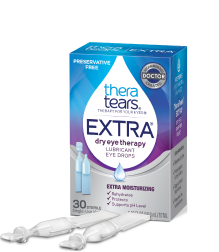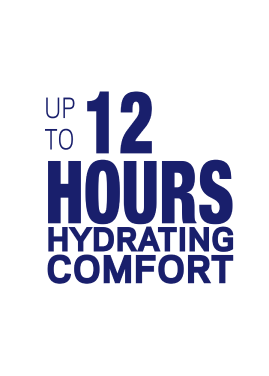Science-Backed Hydration™

Debunking Common Beliefs about Nighttime Eye Care
Across generations, there have been common beliefs about vision and the eyes that aren’t necessarily true or are only partially true. For example: carrots provide Vitamin A which is good for your eyes, but eating carrots alone won’t protect your vision. Eating a healthy diet that gives you the multiple nutrients that are vital to eye health—such as the vitamin A in carrots as well as omega 3s, antioxidants, zinc and vitamins C and E—is more important.
As with vision, certain beliefs about nighttime eye care confuse people as well. We’re here to give you the facts and clear up some common misconceptions.
6 Myths Around Needing a Nighttime Eye Care Routine
Myth 1: Reading in low light will damage your eyes.
As part of a nightly routine, many people wind down with a book before bed to give their eyes a rest from the screens they’ve looked at for much of the day or to ease into sleep. While reading in dim light can cause eye strain from the eyes having to work harder to see, the risk of any long-term damage is low. Our eyes adjust to different levels of lighting and also tell us when they’re getting tired. If you find yourself squinting or struggling to read, it may be time to close your book.
Myth 2: Sleeping in extended-wear contact lenses is safe.
About a third of contact lens users admit they wear their lenses when sleeping or napping. The problem is that even with extended wear contact lenses, vital oxygen and lubricating tears can have trouble reaching the cornea, potentially making the cornea more vulnerable to bacteria. Contacts, if not cleaned properly, can hold onto dirt and bacteria they collect through the day through normal wear. Sleeping in these lenses then gives the bacteria the dark, warm environment in which they thrive and grow.
It’s best for your eyes if you do not sleep while wearing contacts. However, if you have extended wear contact lenses and want to sleep in them, be sure to clean them before you go to bed and when you wake up or as otherwise directed. And give your eyes a break—don’t sleep with contact lenses in every night. Even better, talk to your eye doctor about what’s best for your personal eye health needs.
Myth 3: If you have a morning or daytime eye care routine, you don’t need a night one, especially if your eyes aren’t dry or sensitive.
Whether you realize the effects or not, your eyes are exposed to multiple irritants every day. Dust, pollen, pollution and even UV rays constantly challenge your eyes’ natural protective features. You can help your eyes stay lubricated and healthy by taking a little extra care of them. A morning eye care routine should include preparation and protection for the day. This can be as simple as making sure you bring sunglasses to wear when outside, use eye drops for allergies or redness if you work outside, or apply drops for dry eyes if you do work that requires intense focus or a digital screen.
A nighttime eye care routine can focus on refreshing and lubricating. When you sleep, your eyes barely blink, so your tear film is not naturally replenished. In addition, oftentimes, bedroom air overnight can be drying, especially if your air conditioner or heat is running. Having an evening routine that includes nighttime eye drops to preserve your tear film and running a humidifier to moisten the air can help you wake up with eyes that feel refreshed instead of red, dry and sticky. Also, if your eyes feel tired or uncomfortable in the evening, you can refresh them by washing your face and eyelids and applying a warm compress.
Myth 4: Nighttime eye treatments are all goopy, thick and blur your vision.
Not all nighttime eye treatments are thick and blur your vision. You have options. (See “Optimal Relief: The Best Nighttime Eye Drops for Dry Eyes.”) If your doctor recommends a nighttime eye ointment for dry eyes, yes, this will likely be thick and goopy for a period after you apply it, as well as somewhat more difficult or messy to apply.
TheraTears® Liquid Gel Nighttime Dry Eye Therapy Lubricant Eye Gel featuring a unique hypotonic and electrolyte balanced formula for soothing, longer-lasting relief and protection for nighttime use. Formulated with just the right thickness so it won’t blur your vision, even if you have to get up shortly after applying them.
Myth 5: Red eyes in the morning are simply a fact of life.
There are many reasons you may wake up with red eyes in the morning, but most of them are preventable. Eye strain, lack of sleep, allergies, dehydration (due to drinking alcohol or not enough fluid intake) and dry eyes can cause you to wake up with red eyes in the morning. Changing some simple lifestyle habits can be the solution. Taking more eye breaks when you’re working, wearing sunglasses to shield your eyes outdoors and drinking more water during the day are just three examples.
If your eyes are becoming dry overnight or simply need more lubrication during sleep, eye drops formulated for nighttime can help, like TheraTears® Liquid Nighttime Dry Eye Therapy Lubricant eye gel. If you notice your eyes are red and irritated during the day, you can use drops like TheraTears® Dry Eye Therapy Lubricant eye drops while at work or when you come home to soothe the burning and clear the redness.
Redness in your eyes should not be a daily problem, and if it is, or if the redness and pain become severe, call your doctor to see if something more serious is at fault.
Myth 6: Eye exams aren’t needed if you have 20/20 vision.
If you can see clearly and feel like you have no problems with your eyes, that’s fantastic! However, eye health problems can start without any noticeable changes in vision or appearance. The best way to keep your eyes as healthy as possible is to have yearly checkups with an eye doctor. While this may not be a tip specific to nighttime, it is important, and if you haven’t had an eye doctor visit lately, plan to schedule one.
For tips on setting up a nighttime eye care routine, see our article, “The Importance of Nighttime Eye Care.”
EXTRAordinary relief, now available in preservative free vials
TheraTears EXTRA dry eye therapy

EXTRAordinary relief, now available in preservative free vials

